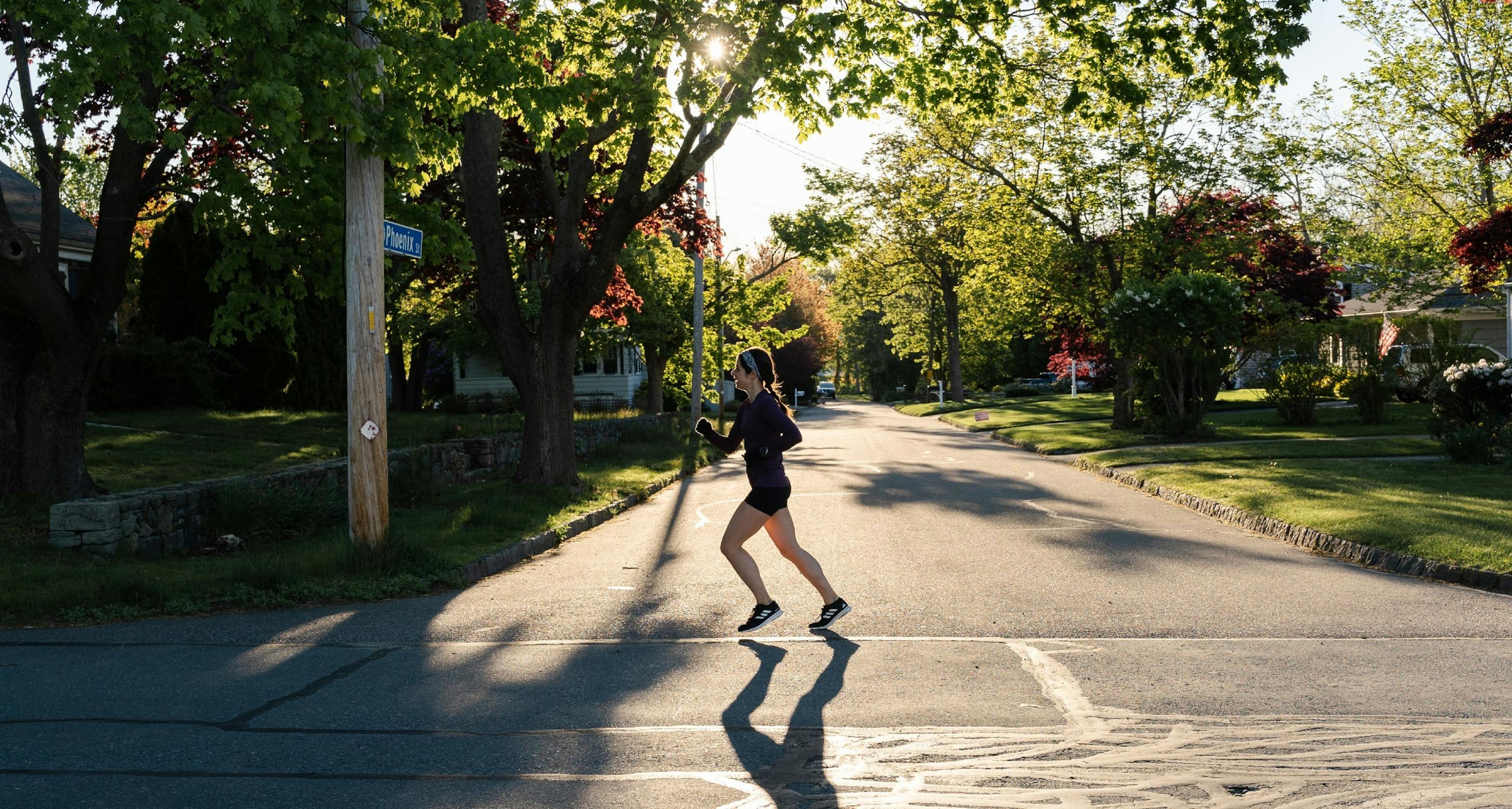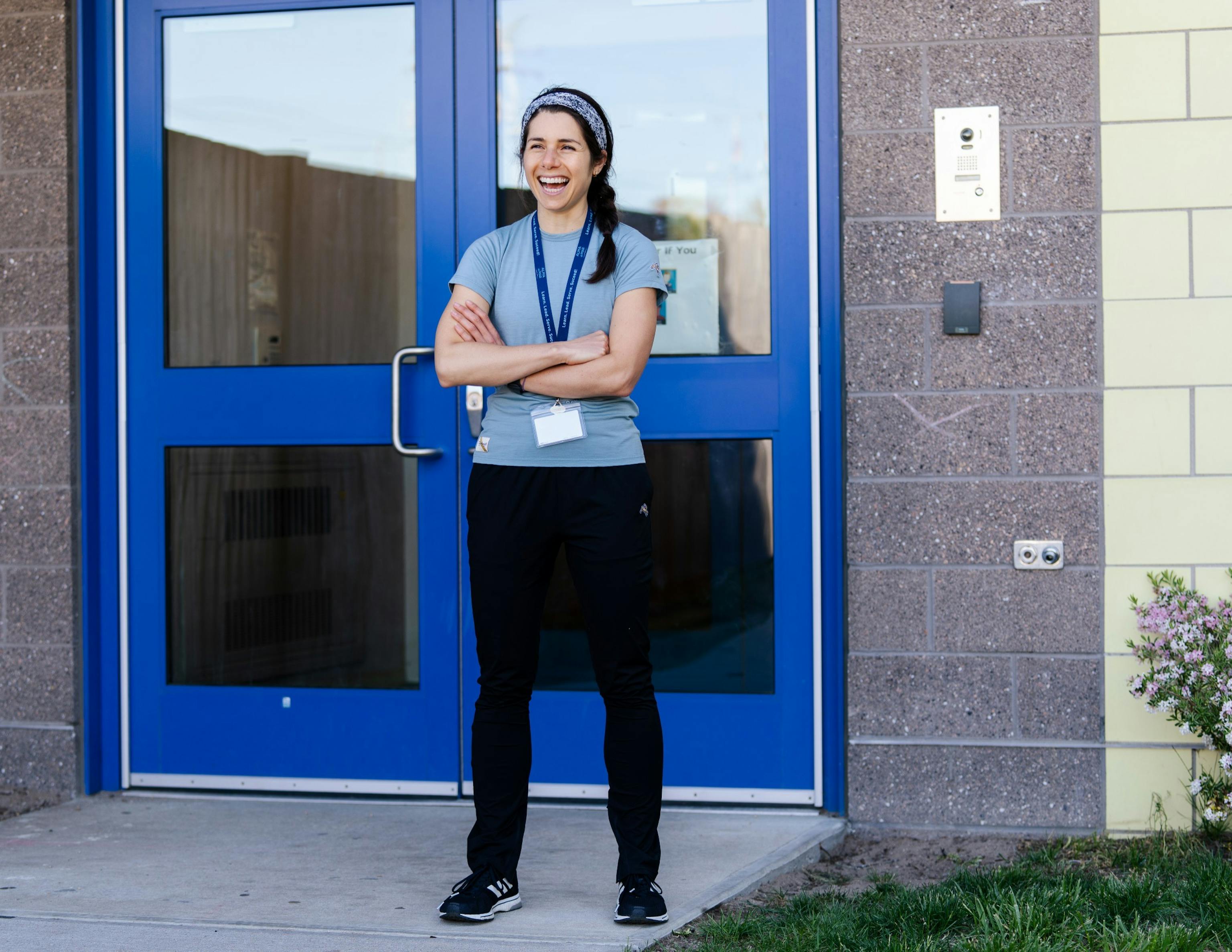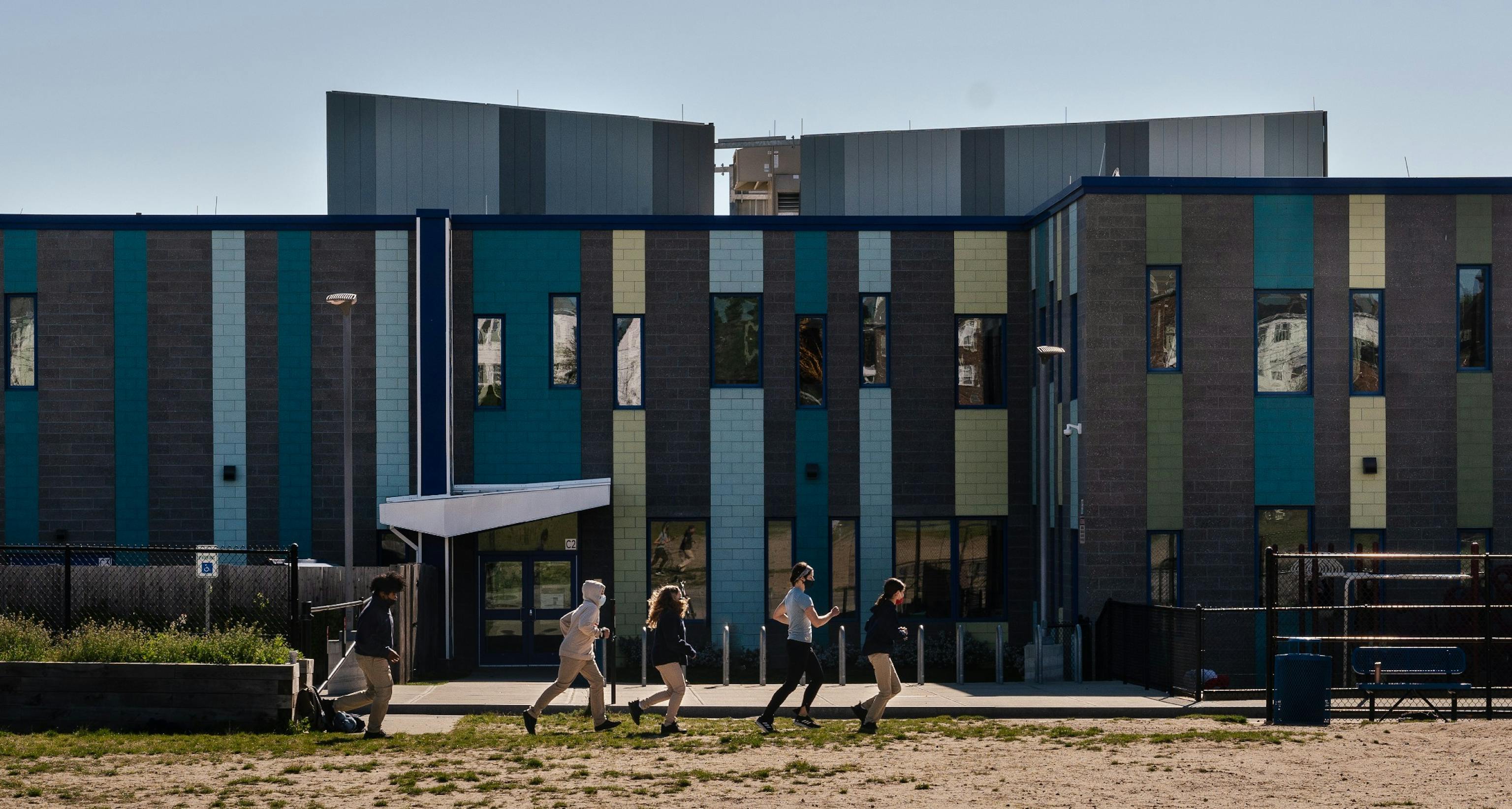

Running for the Ages
Words by Heather Mayer Irvine
Photography by Aisha McAdams
Kids are impressionable. Rebecca Cotugno, 34, knows that as well as, if not better than, most people. Her mind meanders back 23 years earlier, when she sat alone in the middle school gymnasium listening to the PE teacher and cross-country coach, Mr. Gonsalves introduce pre-teens to the sport. “I just thought he was the coolest person, and I was so inspired by him,” Cotugno says.
“Mr. Gonsalves.” Cotugno is 34 but still refers to her coach and teacher formally, the way she knew him. A former runner for the Boston Athletic Association, Mr. Gonsalves raced the Boston Marathon while Cotugno was one of his charges. She was 12 and snapped a Polaroid of him at the 14-mile mark in Wellesley.
“I distinctly remember him after he ran the marathon,” she says. “He gave us a recap and told us what every mile was like: ‘Mile 1 I was feeling good. Mile 2 I was feeling good. Mile 5 I was cruising.’ I didn’t understand it back then, but he brought a passion to the sport that was undeniable.”
Mr. Gonsalves had funny sayings and antics, Cotugno remembers, like when he turned his hand into a phone and made it ring. “It’s the call. Are you going to answer the call?” He’d ask his team of wide-eyed middle schoolers before they started practice. “He’d say things like, ‘downshift, cruise control, finesse.’ I don’t think we understood any of it. So much of what he actually meant was lost, but the passion was there.”

Middle school cross-country wasn’t the first time Cotugno had been exposed to the sport of running. Her parents are lifelong runners. She assumed everybody’s parents got up at 4 or 5am to log miles. “I didn’t realize it wasn’t a normal thing until much later,” she says – not until high school or even college.
Cotugno, who grew up in Needham, Massachusetts, remembers when she stood at mile 14 of the Boston Marathon – specifically, at the duck pond near the library in Wellesley. Her parents ran the marathon – anyone who grew up watching the famed race calls it “The Marathon,” by the way – and even as a 7-year-old kid she felt inspired. She knew the race was something special. “I remember thinking, this is so cool, I want to do this. I want to run,” as she waited for hours to hand her mom a banana. Right around the time Cotugno joined cross-country, she started running with her mom. They’d log a mile, maybe two, together, before her mom would finish up alone. Cotugno caught the running bug.
Today, Cotugno is a literacy specialist at Alma del Mar Charter School in New Bedford, Massachusetts, where the majority of the students are People of Color who live below the poverty line. She works with children who struggle with reading and writing. Cotugno has run the Boston Marathon – The Marathon – four times and clocked a personal best of 3:19 in Chicago in 2019, qualifying her for the 2020 (now 2021 Boston race). She’s also a running coach and logs roughly 60 miles per week.
Three years ago Cotugno launched “Speed Crew,” a morning running group for her young charges. It stemmed from Cotugno’s own passion for running and exercise, as well as research that has found regular physical activity can help students better focus in the classroom.
A 2014 study published in Pediatrics, for example, found that when kids exercised regularly, their ADHD symptoms decreased in severity, and they had improved cognitive and brain function during activities that required executive control.
And according to the organization, Active Schools, whose aim is to increase physical activity in schools, kids who exercise for an hour each day do 20 per cent better in class, miss fewer days of school per year, and have 40 per cent less disciplinary complaints.
“The outlet these kids get from physical activity is what I needed when I was younger,” she says.


The kids who participate in Speed Crew (which was put on hold a year ago at the onset of the COVID-19 pandemic) range from ages 8 to 11, and struggle with things like ADHD and focus challenges.
In addition to noticing more attentiveness in the classroom, Cotugno saw her students experience a natural side effect of running, the one she still experiences after every run: a sense of achievement. “Achievement wasn’t one of the things I thought about when forming this group,” she says. “That wasn’t the objective, but it naturally morphed into that.” The kids, she says, eagerly logged their weekly miles, comparing their notes to previous weeks. Sometimes they’d score a medal – from Cotugno’s own bounty – for their hard work. On the other end of the age spectrum, Cotugno has coached women in their 60s who have that same sense of achievement when they complete a workout or a race.
Running – the act itself and the commitment to hard work – has been an anchor for Cotugno throughout her life. And while Cotugno has gotten faster and faster over the years, it’s the journey and the opportunity to share her love of the sport that keeps her energized.When Cotugno ran cross-country in high school the team was terrible. It’s also when she had the most fun. As a high school track athlete, she became more competitive, running the indoor 600 meters, 4x400, and the outdoor 400 meters, 800 meters, and 4x400. “Because of that competition I didn’t love [running] as much,” she says. “It’s when I loved running the least.”
When the COVID-19 pandemic caused the world to grind to a halt over a year ago, Cotugno left the classroom when schools closed. Speed Crew got canceled. But she had running. At one point Cotugno logged upward of 80 miles per week to focus her energy somewhere. (That was not a great habit, she said). It took a toll on her body.
She missed the classroom, and teaching remotely took a toll on her mind. She considered leaving teaching. “Running was definitely my saving grace.” Cotugno dialed back her mileage but would, some days, log 10 miles before having to sit at her computer for a day of remote teaching. Like her Speed Crew kids, she found she could better focus.
“Running was something that grounded me, allowed me to be calm and teach.” She worries her students, who attend school online now, aren’t keeping up with their running, or even physical activity in general. She knows they’re sitting in front of video games over the weekend. After all, she doesn’t have control over what her students do at home.
But Cotugno knows that running can help people – young and old – overcome trying times, like a pandemic. Running is hard, she says, even if you’re good at it. It takes a special kind of commitment to lace up when you don’t want to, when the weather is terrible, when video games are calling.
She wants her students and their families to run or exercise together, to hold each other accountable. Before the world shut down, one of her kids got his dad to train for a Father’s Day 5K with him. Another went from walking most of the Speed Crew laps, logging just one or two during the 30-minute period, to running nearly the entire time. “Setting aside time every day to exercise, making it a routine, can be really helpful,” Cotugno says.

Running is often thought of as a selfish endeavor. You lace up, leave your family and responsibilities for hours at a time. Sure, running can be a team sport, but often – especially during a pandemic – it’s solitary. But what non-runners don’t see is how much runners want to bring others into the fold. Cotugno, while technically a certified running coach, doesn’t consider herself a coach for her Speed Crew kids.
“I see myself more as a champion and a supporter,” she says.
Cotugno relishes in her students’ successes, especially the young girls who often aren’t encouraged to enter into sports. She thinks about one girl who wasn’t in Speed Crew – her group is for students in grades 3 through 5 – but ran for the middle school cross-country team. She ran a 5K and was really into it. “It’s exciting when I see a girl who wants to run.
It’s not lost on Cotugno that her running journey, while not ending anytime soon, has come full circle. Physically and temporally, she’s far removed from the Needham middle school where she sat in awe of Mr. Gonsalves who ran the Boston Marathon and yelled, excitedly, about finesse. Whatever that was.
Cotugno has her own captive audience now, who log as many 0.2-mile laps before school as they can. Right now they probably don’t understand the significance of The Marathon, but they sense their teacher’s unwavering dedication - to them, and to running.
They’re impressionable, she knows this. Maybe, 23 years from now one of her kids will remember Ms. Cotugno and the medals she brought in from her own accomplishments to celebrate theirs.
“It’s more about the journey than the ending.” Cotugno pauses. “There doesn’t need to be an ending.”
